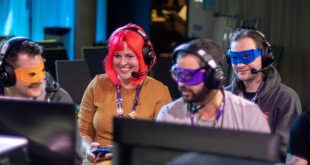Several years ago famed designer Raph Koster told a crowd of several hundred industry professionals and aspiring game makers: “Being creative is not necessarily a unique virtue.” You could hear a pin drop. The celebrity game maker dared to desecrate the sanctity of creativity by calling it unremarkable.
For years we’ve clung to the idea that the only path to success was that of a single brilliant person working tirelessly on a creative vision. Consider, for instance, Eric Barone, the designer behind indie darling Stardew Valley, who stated: “I really truly believe that if you create the right game, and it’s a really good game, it’ll hype itself. It’ll market itself.” As if by magic, a marketplace will naturally become efficient, players will have no trouble finding content they enjoy, and artists find critical acclaim purely on the merits of their work. Because that is how billion-dollar industries function, right?
In the case of Stardew Valley, its creator was, of course, correct. Barone’s game sold over ten million copies and generated millions in revenues. But this narrative conveniently overlooks the fact that Barone’s girlfriend subsidized Stardew Valley’s development for years despite being in school. It effectively shielded him from any financial accountability while working on his game. Behind every successful independent game designer stands a parent, friend, spouse, or sibling who helped out. No one makes games in a vacuum.
We’ve come a long way. After teetering on the fringes for decades, video games have finally become a mainstream form of entertainment. It took a few decades and a global pandemic but now all signs point toward interactive entertainment finally having its day in the sun.
Game company valuations are skyhigh, investors continue to pour money into the market, and quite literally all of the biggest firms in the world are spending billions to claim their stake. It’s not that we needed the validation of others to know that this is an exciting industry. But it sure is nice to have outgrown our awkward teenage years and become a fully-grown cultural form of expression.
This recent ascension also comes with important new affordances. For one, the industry’s “ internal logic” is in desperate need of a revision. Specifically, the stories we tell ourselves about ourselves – the industry’s shared narrative on how it works – is in need of an update.
The myth of the lone genius is just one of the many unexamined clichés that has long guided our decision making. As if to say that what truly matters in the games industry does not require the input of any of its other participants. Perhaps because of its incredible growth, a large disparity continues to exist between the games industry’s conventional wisdom and an economically grounded approach to how it functions and innovates. What got us here won’t carry us much further.
Now that we have the attention of the world, we owe it to ourselves, our craft, and our audiences to think as creatively about the business as we do about content. To do that we’ll have to broaden our understanding to include the wider intercourse between game designers, producers, industry analysts, financiers, marketing specialists, and other decision-makers. They all earn a living by busying themselves with the creation of interactive entertainment and accordingly shape the industry at large. Talent will always be a critical component. But it is not the only thing that matters. Time for a new strategy guide.
Joost van Dreunen teaches at the NYU Stern School of Business and is the author of One Up: Creativity, Competition, and the Global Business of Video Games. Previously Joost was co-founder and CEO of SuperData Research, a games market research firm, which was acquired by Nielsen in 2018. He currently serves as an advisor to Parsec Gaming, and publishes a newsletter on gaming, tech, and entertainment called SuperJoost Playlist. More details at www.superjoost.net.

 MCV/DEVELOP News, events, research and jobs from the games industry
MCV/DEVELOP News, events, research and jobs from the games industry




